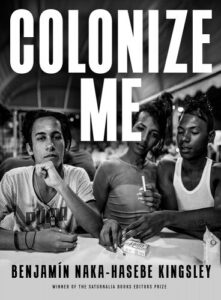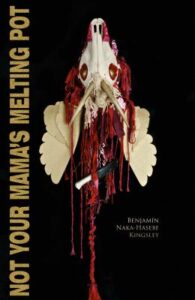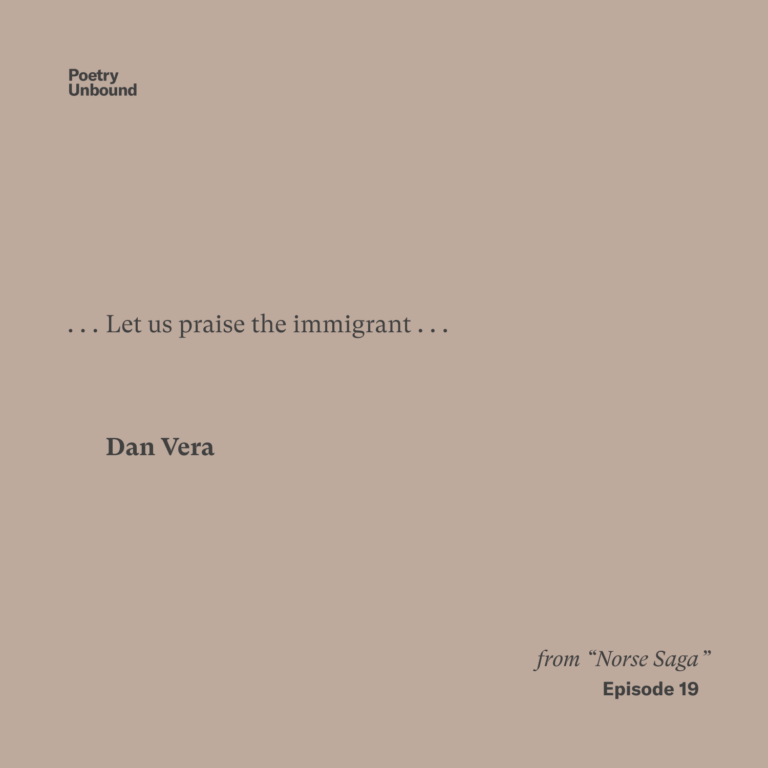Benjamín Naka-Hasebe Kingsley
small talk or in my hand galaxies
On the day you wake to a broken window in your car, what do you do? And what happens when the woman repairing that window offers a glimpse of something new?
We’re pleased to offer Benjamín Naka-Hasebe Kingsley’s poem, and invite you to connect with Poetry Unbound throughout this season.
Pre-order the forthcoming book Poetry Unbound: 50 Poems to Open Your World and join us in our new conversational space on Substack.

Guest

Benjamín Naka-Hasebe Kingsley belongs to the Onondaga Nation of Indigenous Americans in New York. He is the author of Dēmos (Milkweed 2021), Colonize Me (Saturnalia 2019), and Not Your Mama’s Melting Pot (University of Nebraska Press 2018). Naka-Hasebe Kingsley is an assistant professor of English at Kalamazoo College.
Transcript
Pádraig Ó Tuama: Friends, thanks very much for listening to Poetry Unbound. The Poetry Unbound book is out in loads of places around the world, and it’s almost out in the U.S. On December the 6th it will be launched in the U.S. And they’ll make a great holiday gift if you want to buy one or more than one. You can preorder a copy of the book at poetryunbound.org. And if you’re listening before the launch date, you can join us for an online launch in the evening of December the 6th. It’s all free and you can register for that too at poetryunbound.org. I look forward to meeting you on the page or meeting you at the launch.
[music: “Praise the Rain” by Gautam Srikishan]
My name is Pádraig Ó Tuama and one of the things that enlivens and challenges me about certain forms of art is that they’re not just saying, “look at me,” it’s not just an artist saying, “look at this event,” but somehow the art is looking back at you. So the gaze of the viewer is also being scrutinized. And that might mean that you suddenly have to realize, “this person isn’t a pawn in my story, this person is a person in and of themself. Their universe is as important to them as my universe is to me. And in fact, their universe might convert or change or challenge my understanding of the universe.”
[music: “Praise the Rain” by Gautam Srikishan]
“small talk or in my hand galaxies” by Benjamín Naka-Hasebe Kingsley
“it looks like the thief rocketed
their whole self through
the bull’s eye of my driver’s side door
and you’re not wrong to expect
the old joke about there being
nothing in my car worth the thieving
or maybe i’ve caught you eye rolling
please god not another
poem about windows but i cross my
fingers hope to die suck on diesel
and be hogtied i’ll avoid simile
for the eye and soul and i’ll be
careful as the fixer’s hands
who came to pry waterlogged
lining from my inner door
her small boots crunching sun in the
glittered puddle of fractured glass
i think how i didn’t think to sweep
but even so she is still kind i think
to get her a glass of tap water now
but then think of all the stairs
she says this big sol reminds her
of cuba y tu she asks but i don’t
relish speaking spanish anymore
i tell her no i have always lived
here in miami i lie but offer my father
was a mason and bueno too at that
i’ve given her this one fractled truth as if
it could be understood not to mistake
my soft handshake for ignorance
of all the working classes but she
is not thinking of me only the door’s
motor grinding she asks but what do i do
i hope she will ask
if maybe i am a mason myself but no
i say i am maybe a writer
me too she beams and offers a full palm
of what she’d vacuumed from the doorframe
shattered glass beads of blue refraction
wonder she says wonder at all they have
seen she insists ver towards the tiny eyelets
en mi mano galaxias she says and i wonder
how often i have mistaken myself
for the seer for the see-er
and others simply as the seen.”
[music: “Memoriam” by Gautam Srikishan]
So this brilliant poem by Benjamín Naka-Hasebe Kingsley has a magnificent tone of casual conversation to it. His car has been broken into, or at least the window has been broken: “it looks like the thief rocketed / their whole self through / the bulls eye of my driver’s side door”. Even the description of that, it makes you think this is someone who’s looking at: “how did they do that?” Rather than, “oh my God, my poor car.” And then, immediately, he addresses us the readers, or the hearers of the poem, “and you’re not wrong to expect / the old joke…” you know about there’s nothing in the car worth stealing. And then he’s addressing a kind of a poetry anxiety. “Don’t worry. Don’t worry. I’m not going to make this into some big simile about windows being a stand in for the eye or the soul.” And there is a gathering into a conversation.
But underneath that gathering into the conversation, what we’re hearing is a certain self consciousness too, and a certain way within which the speaker of this poem has a certain kind of self-involved anxiety. And I don’t mean self-involved in a negative sense. I mean that they’re involved in their own world where he’s thinking, “oh, are you going to think that I’m not working class just cause I’m a writer? Are you going to think that just because I start off a poem by a reference to a broken window that I’m automatically going to mean the soul and the eye? Are you going to think this, are you going to that?” This is the inner world, the inner anxiety, the worry of the writer that’s coming across in such a likable way.
What’s amazing is the intervention of the fixer, the mechanic. She arrives like a spark of light. She arrives like a different tune. And that is held together quite brilliantly in one of the times when he’s worried about what’s going on, what are you thinking? And he says, she’s “not thinking / of me only the door’s / motor grinding”.
I love how she is focused on what she’s doing in her job as the fixer and mechanic, and also in her freedom to be herself and to engage with him. She is almost like a counterpoint to his self consciousness.
[music: “Into the Earth” by Gautam Srikishan]
In the opening lines he is a little bit apologetic, and it’s also clever because he’s saying, “no, stay with me. Something’s going to happen.” And what’s amazing is that he too is the site of surprise. He isn’t really in control of surprising us as the reader. Somehow in the midst of his car window being broken and the door needing to be fixed and everything involved in all of that, somehow it was the fixer and the mechanic, it was her capacity to hold surprise, her capacity to be in the moment to not, it seems, be overly burdened with the kind of artistic self consciousness that he has, even though they’re both artists. When he says to her, “i am maybe a writer / me too she beams”. I love that verb there, “beams.”
And then she “offers a full palm / of what she’d” gathered “from the doorframe”. There’s an openness to her, a generosity, a giving. She isn’t trying to take anything. She’s trying to share something. And there’s a powerful contrasting of these two characters. I’m not surprised that she captivated his imagination in her skill as an artist, as a person, as a mechanic. Because she holds within herself a magnificence of being alive. That does really seem to be an invitation to him to find that and to let that spark also be in him, which is what she’s inviting him to step into.
[music: “First Grief, First Air” by Gautam Srikishan]
This poem, unusually, has two titles, “small talk or in my hand galaxies”. It’s almost like the poem is trying to consider: what is it about? Or two different ways of looking at the same thing. Just saying that this is a conversation about small talk, would, perhaps be a way of dismissing the poem. But then he quotes her: “in my hand galaxies”. “en mi mano galaxias” is what she says to him in Spanish. And you see in the tension between these two possible titles, the tension that he’s carrying in himself. And even in the title, he’s inserted a space between: “in my hand” there’s a longer space between the word, “hand” and “galaxies” than there is between the rest of the words in the title.
There’s so much space, even in the second offering. In a certain sense, he is in a galaxy of his own, a galaxy that’s turning on itself. And her invitation to him of saying, “en mi mano galaxias”, that is a way of saying, “Look at what we can contain. Look at the brokenness that we can contain, and look at the beauty of it.” It’s utterly gorgeous. She insists “ver”, watch. And then he calls the little beads of broken glass, tiny eyelets. What are they looking at? What are they seeing?
He is being seen through this poem. And one of the things that’s interesting for him is that the surprise of the poem is that he is the one who’s being looked back at. And he’s trying to capture that experience. It’s a de-familiarizing experience. It’s unexpected. It causes him to question his place. And, in a certain sense, he who is at the center of his own galaxy so much throughout this poem is suddenly displaced. He’s seeing that everything is much bigger. And he’s being brought in to wonder the wonder that she proclaims to him, “wonder,” she says, “wonder at all they have seen.”
It’s almost like the ambivalence of the title of the poem is held here in the points of view of these two people. One person sees small talk, but the other person sees “en mi mano galaxias”: “in my hand galaxies”.
[music: “Daybreak” by Gautam Srikishan]
There’s three instances of a particular phoneme throughout this poem: fractured, fractled, and then refraction. And the “frac” here comes from the Latin verb, frangere, meaning break, and the glass is broken. That’s the fractured glass. And then there’s the fractled truth. And then as she holds out her hand with the glass beads on it, “refraction”.
It’s such an interesting meditation in this poem about breaking the truth, about breaking the glass, and then about light being broken and seeing something new in broken light. She is inviting him to to see something in a new way, and that he might be seen again, made again, in a certain sense, brought into, something enormous. And you can hear, again, his ambivalence in the dual title of the poem, “small talk or en mi mano galaxias in my hands galaxies.”
There’s something about when you write a poem that you are hoping, I suppose, to be in a certain kind of control about what the poem is going to do. And this poem is such an interesting invitation to artists to consider, “what would it be like if actually you weren’t in control? What would it be like if you realized that you’re being remade through the art and the art or the experience is looking back at you? How would it be for you to discover rather than describe?”
[music: “Daybreak” by Gautam Srikishan]
The fixer, when she comes, she’s not even described deliberately, she kind of comes in obliquely because he’s saying, “…i’ll be / careful as the fixer’s hands / who came to pry waterlogged / lining from my inner door”. He’s saying, “I’ll be like her in the way that I unfold the poem.” So suddenly she’s there, but she’s not actually living and breathing there. She’s just being used as a way to say, oh, she’s like a metaphor.
But then, amazingly, the poem turns and he begins to see her. And much more importantly than that, he begins to experience being seen by her. This is an invitation to him to see himself anew, and he is being invited to see an entirely new galaxy and also, perhaps, to see the fractured things in himself through a new disposition.
[music: “Daybreak” by Gautam Srikishan]
“small talk or in my hand galaxies” by Benjamín Naka-Hasebe Kingsley.
“it looks like the thief rocketed
their whole self through
the bull’s eye of my driver’s side door
and you’re not wrong to expect
the old joke about there being
nothing in my car worth the thieving
or maybe i’ve caught you eye rolling
please god not another
poem about windows but i cross my
fingers hope to die suck on diesel
and be hogtied i’ll avoid simile
for the eye and soul and i’ll be
careful as the fixer’s hands
who came to pry waterlogged
lining from my inner door
her small boots crunching sun in the
glittered puddle of fractured glass
i think how i didn’t think to sweep
but even so she is still kind i think
to get her a glass of tap water now
but then think of all the stairs
she says this big sol reminds her
of cuba y tu she asks but i don’t
relish speaking spanish anymore
i tell her no i have always lived
here in miami i lie but offer my father
was a mason and bueno too at that
i’ve given her this one fractled truth as if
it could be understood not to mistake
my soft handshake for ignorance
of all the working classes but she
is not thinking of me only the door’s
motor grinding she asks but what do i do
i hope she will ask
if maybe i am a mason myself but no
i say i am maybe a writer
me too she beams and offers a full palm
of what she’d vacuumed from the doorframe
shattered glass beads of blue refraction
wonder she says wonder at all they have
seen she insists ver towards the tiny eyelets
en mi mano galaxias she says and i wonder
how often i have mistaken myself
for the seer for the see-er
and others simply as the seen.”
[music: “Praise the Rain” by Gautam Srikishan]
Chris Heagle: “small talk or in my hand galaxies” comes from Benjamín Naka-Hasebe Kingsley’s book Dēmos. Thank you to Milkweed Editions who gave us permission to use Benjamín’s poem. Read it on our website at onbeing.org.
[music: “Praise the Rain” by Gautam Srikishan]
Poetry Unbound is: Gautam Srikishan, Eddie Gonzalez, Lilian Vo, Lucas Johnson, Amy Chatelaine, Kayla Edwards, and me, Chris Heagle.
Our music is composed and provided by Gautam Srikishan and Blue Dot Sessions.
This podcast is produced by On Being Studios, which is located on Dakota land. Open your world to poetry with us by subscribing to our Substack newsletter at poetryunbound.org. You may also enjoy our other podcast On Being with Krista Tippett, or our newsletter, The Pause. Visit us at onbeing.org to find out more.
Books & Music
Recommended Reading
The On Being Project is an affiliate partner of Bookshop.org and Amazon.com. Any earnings we receive through these affiliate partnerships go into directly supporting The On Being Project.









